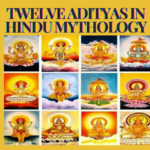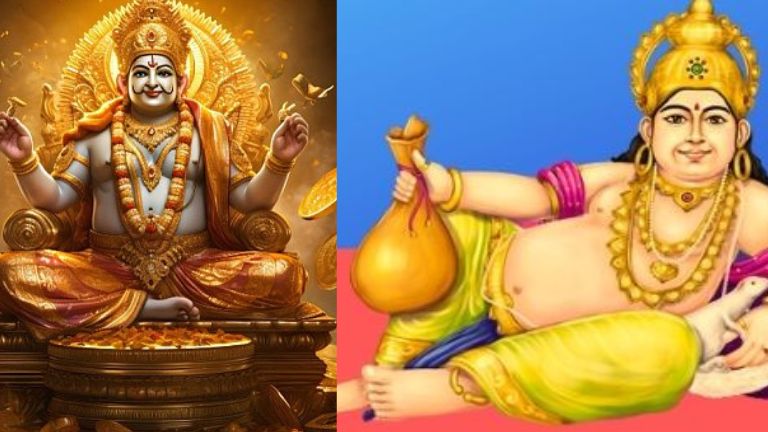Kubera, also known as Kuvera, is a prominent deity in Hindu mythology, revered as the Lord of Wealth and the King of the Yakshas. His story, deeply rooted in ancient scriptures, is a tale of divine intervention, transformation, and the ultimate triumph of good over evil. One of the most captivating narratives surrounding Kubera is his origin, which is intricately described in the Shiva Purana. This article delves into the fascinating tale of how a mere thief named Gunnidhi ascended to the divine status of Maharaja Kuber.
The Early Life of Kubera: A Divine Lineage.
Kubera was born to Rishi Vishrava, a wise and respected sage, and was destined for greatness. His lineage itself was divine, as Rishi Vishrava was a descendant of the great sage Pulastya, one of the ten mind-born sons of Brahma. However, despite his auspicious birth, Kubera’s path to becoming the Lord of Wealth was not straightforward. The tale of his transformation from a mortal being to a revered deity is a testimony to the complexities and mysteries of Hindu mythology.
Gunnidhi: The Thief with a Twist of Fate.
Before becoming the deity Kubera, he was known as Gunnidhi, a notorious thief. Gunnidhi’s life was far from the righteous path, and his deeds were anything but virtuous. He was a man driven by greed and materialistic desires, often resorting to theft to fulfill his insatiable hunger for wealth. However, his story is not just one of crime but also of repentance, redemption, and divine grace.
The Turning Point: A Divine Encounter.
Gunnidhi’s life took a drastic turn one fateful night when he encountered a divine Shiva Lingam while fleeing from the scene of his crime. Exhausted and seeking refuge, Gunnidhi found solace in a dilapidated temple dedicated to Lord Shiva. Little did he know that this night would change his life forever. As he rested in the temple, Gunnidhi unknowingly performed a significant act of devotion. He placed a bilva leaf, a sacred offering to Lord Shiva, on the Lingam, an act that would alter his destiny.
The Blessing of Lord Shiva.
Unbeknownst to Gunnidhi, his seemingly trivial act of placing the bilva leaf on the Shiva Lingam was recognized by the deity. Lord Shiva, known for his benevolence and mercy, was moved by this inadvertent act of devotion. In Hindu mythology, it is believed that even the smallest gesture of true devotion does not go unnoticed by the gods. Lord Shiva decided to bless Gunnidhi, not for his past deeds, but for the sincerity of his unintentional worship.
Transformation into Kubera.
As a result of Lord Shiva’s blessings, Gunnidhi was transformed into Kubera, the Lord of Wealth. This transformation was not just physical but also spiritual. Kubera was bestowed with immense wealth, prosperity, and the responsibility to safeguard the treasures of the world. He was appointed as the King of the Yakshas, a group of benevolent nature spirits known for their wealth and prosperity. Kubera’s role was to distribute wealth and ensure that it was used for the betterment of humanity.
Kubera’s Role in Hindu Mythology.
Kubera’s significance in Hindu mythology extends beyond his association with wealth. He is often depicted as a portly figure, adorned with jewels and holding a pot of gold. However, his importance is not limited to material wealth. Kubera is also considered the guardian of the North Direction and is one of the Dikpalas, the eight guardians of the directions in Hindu cosmology.
Kubera in Hindu Epics.
Kubera’s presence is prominently featured in several Hindu epics. In the Ramayana, Kubera is described as the half-brother of the demon king Ravana. Despite their familial ties, Kubera’s righteousness contrasts sharply with Ravana’s arrogance and evil deeds. Kubera’s city, Alaka, located in the mythical Himalayas, is described as a place of immense beauty and prosperity.
In the Mahabharata, Kubera is portrayed as a generous deity who grants wealth and prosperity to those who worship him with sincerity. His interactions with the Pandavas during their exile further emphasize his role as a benevolent deity who aids those in need.
The Symbolism of Kubera.
Kubera is more than just a deity of wealth; he symbolizes the moral and ethical use of wealth. In Hindu philosophy, wealth is considered one of the four Purusharthas, or goals of human life, along with Dharma (righteousness), Kama (desire), and Moksha (liberation). Kubera’s story teaches that wealth, when acquired and used righteously, can lead to prosperity and spiritual growth.
Kubera Puja: Worship and Significance.
Devotees of Kubera often perform Kubera Puja to seek his blessings for wealth and prosperity. This ritual is usually conducted during the festival of Dhanteras, which marks the beginning of Diwali. Kubera Puja is believed to attract wealth and ensure financial stability for the household. The mantra “Om Hreem Shreem Hreem Kuberaaya Namaha” is chanted to invoke the blessings of Kubera.
Who killed Kubera?
Ravana set out from Lanka to vanquish Kubera’s district in Mount Kailash taking an enormous armed force alongside him comprising of fearless evil presence fighters of Lanka. In the following fight, Ravana’s soldiers battled with Kubera’s yakshas and crushed them in a brief timeframe. Ravan is a very powerful asur he wants every head to be bow in front of him.
Why did Ravan fight Kuber?
Kubera was dismayed by Ravana’s rehashed assaults on the clerics, on the devas, and all alone yakshas, so he made an impression on him, sibling to sibling. “Your deeds shame our dad,” Kubera’s courier told Ravana. “You really want to stop your awful way of behaving.” Angered, Ravana yelled, “I will kill Kubera for this!
Kubera in Modern Times.
In contemporary Hindu worship, Kubera continues to be revered as the deity of wealth. His blessings are sought by business people, traders, and anyone seeking financial success. Temples dedicated to Kubera can be found in various parts of India, and his image is often seen in homes and businesses as a symbol of prosperity.
Kubera’s story, from the thief Gunnidhi to the Lord of Wealth, serves as an inspiration and a reminder of the transformative power of devotion, repentance, and divine grace. His tale is a testament to the belief that no matter how far one strays from the righteous path, redemption is always possible through sincere devotion and the blessings of the divine.
Disclaimer : While Writing this post have taken some content reference from different blog posts around the web and also chatgpt. If you think I have directly copy paste your content ,please contact me . I assure you that I will remove the content within 24 hours.





